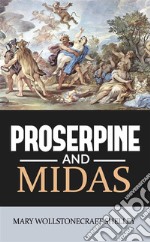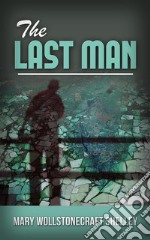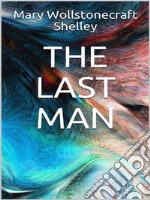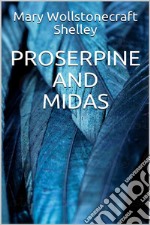The Last Man. E-book. Formato PDF - 9788835390657
di Mary Wollstonecraft Shelley
edito da MIDWEST JOURNAL PRESS , 2020
Formato: PDF - Protezione: nessuna
Found: a future prophecy about our end times - and the pandemic that wiped us out.
Those writings left scattered, unprotected - on their hidden cave's floor to be discovered.
Stumbling by accident upon the entrance to an ancient cavern, the author discovers a collection of prophetic writings painted on leaves by the Cumaean Sibyl.
Deciphering these writings showed a first-person narrative, her text revealing the life of a single man surviving a pandemic apocalypse at the end of our 21st century.
"The Last Man" is Mary Shelley's fantasy exploration of the end of human civilisation by pandemics.
Illness and death rage the world's continents, brought about by government ineffectiveness and political maneuvering instead of developing effective vaccines.
At the book's end, perhaps only one immune person survives, and spends the remainder of his days traveling the now-vacant continents of Europe and Africa. Hoping he'll find someone else.
At over 300 pages, this book is a suitable companion to any period of isolation or self-quarantine due to illness.
Or maybe something to haunt yourself to an uneasy sleep about what just might happen...
- - - -
Set in the late twenty-first century, the novel unfolds a sombre and pessimistic vision of mankind confronting inevitable destruction. Interwoven with her futuristic theme, Mary Shelley incorporates semi-biographical portraits of Romantic figures in Shelley's circle, particularly Shelley's late husband Percy Bysshe Shelley and Lord Byron.
Many of the central characters are wholly or partially based upon Shelley's acquaintances. Shelley had been forbidden by her father-in-law, Sir Timothy Shelley, from publishing a biography of her husband, so she memorialised him, amongst others, in The Last Man.
The utopian Adrian, Earl of Windsor, who leads his followers in search of a natural paradise and dies when his boat sinks in a storm, is a fictional portrait of Percy Bysshe Shelley, although other minor characters such as Merrival bear traces of Percy as well.
Lord Raymond, who leaves England to fight for the Greeks and dies in Constantinople, is based on Lord Byron. The novel expresses Mary Shelley's pain at the loss of her community of the "Elect", as she called them.
Just as her earlier and better known novel Frankenstein (1818) engaged with scientific questions of electromagnetism, chemistry, and materialism, The Last Man finds Shelley again attempting to understand the scope of scientific inquiry. Unlike the earlier novel's warnings about Faustian over-reaching, this novel's devastating apocalypse strongly suggests that medicine had become too timid and ultimately come too late. The ineffectual astronomer Merrival, for example, stands in stark contrast to the frighteningly productive Victor Frankenstein.
Shelley's construction of Lionel Verney's immunity remains a subject of significant critical debate, but the novel certainly demonstrates a deep understanding of the history of medicine, specifically the development of the smallpox vaccine and the various nineteenth-century theories about the nature of contagion.
Mary Wollstonecraft Shelley (1797-1851) was the only daughter of Mary Wollstonecraft, author of Vindication of the Rights of Woman, and the radical philosopher William Godwin. Her mother died ten days after her birth and the young child was educated through contact with her father's intellectual circle and her own reading. She met Percy Bysshe Shelley in 1812; they eloped in July 1814. In the summer of 1816 she began her first and most famous novel, Frankenstein.
Scroll Up and Get Your Copy Now
Those writings left scattered, unprotected - on their hidden cave's floor to be discovered.
Stumbling by accident upon the entrance to an ancient cavern, the author discovers a collection of prophetic writings painted on leaves by the Cumaean Sibyl.
Deciphering these writings showed a first-person narrative, her text revealing the life of a single man surviving a pandemic apocalypse at the end of our 21st century.
"The Last Man" is Mary Shelley's fantasy exploration of the end of human civilisation by pandemics.
Illness and death rage the world's continents, brought about by government ineffectiveness and political maneuvering instead of developing effective vaccines.
At the book's end, perhaps only one immune person survives, and spends the remainder of his days traveling the now-vacant continents of Europe and Africa. Hoping he'll find someone else.
At over 300 pages, this book is a suitable companion to any period of isolation or self-quarantine due to illness.
Or maybe something to haunt yourself to an uneasy sleep about what just might happen...
- - - -
Set in the late twenty-first century, the novel unfolds a sombre and pessimistic vision of mankind confronting inevitable destruction. Interwoven with her futuristic theme, Mary Shelley incorporates semi-biographical portraits of Romantic figures in Shelley's circle, particularly Shelley's late husband Percy Bysshe Shelley and Lord Byron.
Many of the central characters are wholly or partially based upon Shelley's acquaintances. Shelley had been forbidden by her father-in-law, Sir Timothy Shelley, from publishing a biography of her husband, so she memorialised him, amongst others, in The Last Man.
The utopian Adrian, Earl of Windsor, who leads his followers in search of a natural paradise and dies when his boat sinks in a storm, is a fictional portrait of Percy Bysshe Shelley, although other minor characters such as Merrival bear traces of Percy as well.
Lord Raymond, who leaves England to fight for the Greeks and dies in Constantinople, is based on Lord Byron. The novel expresses Mary Shelley's pain at the loss of her community of the "Elect", as she called them.
Just as her earlier and better known novel Frankenstein (1818) engaged with scientific questions of electromagnetism, chemistry, and materialism, The Last Man finds Shelley again attempting to understand the scope of scientific inquiry. Unlike the earlier novel's warnings about Faustian over-reaching, this novel's devastating apocalypse strongly suggests that medicine had become too timid and ultimately come too late. The ineffectual astronomer Merrival, for example, stands in stark contrast to the frighteningly productive Victor Frankenstein.
Shelley's construction of Lionel Verney's immunity remains a subject of significant critical debate, but the novel certainly demonstrates a deep understanding of the history of medicine, specifically the development of the smallpox vaccine and the various nineteenth-century theories about the nature of contagion.
Mary Wollstonecraft Shelley (1797-1851) was the only daughter of Mary Wollstonecraft, author of Vindication of the Rights of Woman, and the radical philosopher William Godwin. Her mother died ten days after her birth and the young child was educated through contact with her father's intellectual circle and her own reading. She met Percy Bysshe Shelley in 1812; they eloped in July 1814. In the summer of 1816 she began her first and most famous novel, Frankenstein.
Scroll Up and Get Your Copy Now
Ean
9788835390657
Titolo
The Last Man. E-book. Formato PDF
Autore
Editore
Data Pubblicazione
2020
Formato
PDF
Protezione
nessuna
Punti Accumulabili








